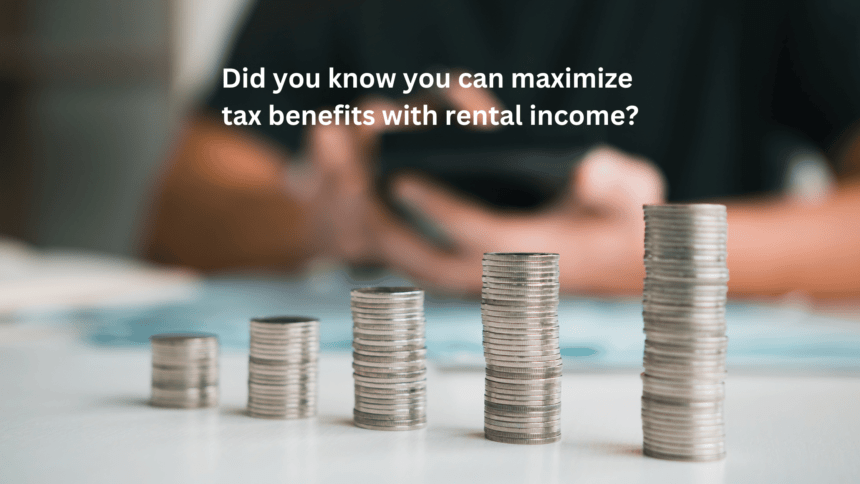Maximizing tax benefits with rental income is crucial for savvy investors looking to enhance profitability and reduce tax liabilities. Efficient tax strategies can significantly impact the overall returns from rental properties. This comprehensive guide explores smart ways to maximize tax benefits, ensuring you make the most of your rental income.
Comprehensive Understanding of Tax Deductions
Tax deductions play a pivotal role in minimizing taxable income from rental properties. Property owners can leverage various deductions such as mortgage interest, property management fees, repairs, and more. Each deduction directly reduces taxable income, underscoring the importance of a thorough understanding of available tax benefits with rental income.
Essential Tax Benefits with Rental Income
Depreciation Benefits
Depreciation is a powerful tool that allows property owners to deduct the cost of the property over its useful life. This non-cash deduction can result in substantial tax savings over time. Calculating depreciation involves determining the property’s basis, recovery period, and applicable depreciation method, thereby maximizing tax benefits with rental income.
Mortgage Interest Deduction
One of the most significant tax benefits with rental income is the deduction of mortgage interest. The interest paid on a mortgage for rental property is deductible, effectively reducing taxable income. Property owners must meet specific criteria, including having a secured loan on the property and using the funds for property-related expenses, to fully capitalize on this deduction.
Property Management Expenses
Deducting property management costs is another smart strategy to maximize tax benefits with rental income. These expenses encompass fees paid to professional managers for services ranging from tenant placement to maintenance. Opting for professional management not only streamlines property oversight but also ensures maximum tax deductions.
Repairs vs. Improvements
Understanding the differentiation between repairs and improvements is crucial for optimizing tax benefits. Repairs maintain the property’s existing condition and are immediately deductible. In contrast, improvements enhance the property’s value and must be depreciated over time. Accurate categorization of expenses ensures compliance with tax regulations and maximizes deductions.
Travel and Transportation Expenses
Deducting travel costs related to property management activities is permissible, including trips for maintenance, inspections, and tenant meetings. Detailed record-keeping of mileage, travel dates, and purposes is essential to substantiate these deductions and capitalize on tax benefits with rental income.
Home Office Deduction
A home office exclusively used for managing rental properties qualifies for deductions, including a portion of mortgage interest, utilities, and insurance. Calculating this deduction involves determining the percentage of the home used for business purposes, offering substantial tax savings opportunities with rental income.
Utilities and Operating Expenses
Utility expenses, such as electricity, water, and gas, paid by the property owner are deductible, as are operating costs like lawn care, pest control, and security systems. These deductions effectively reduce taxable income derived from rental properties.
Insurance Premiums
Deducting insurance premiums, including homeowners, liability, and flood insurance, is essential for protecting the property and maximizing tax benefits with rental income. These costs serve to safeguard the property and the owner’s investment, making them indispensable deductible expenses.
Advertising and Marketing Expenses
Costs associated with advertising and marketing rental properties are deductible, encompassing expenses for online listings, print advertisements, and signage. Effective marketing not only attracts tenants but also generates valuable tax deductions, enhancing overall investment returns with rental income.
Professional Fees
Deducting professional fees for legal and accounting services related to rental property management is advisable. These fees include expenses for lease drafting, tax preparation, and legal consultations, ensuring compliance with laws and regulations while optimizing tax benefits with rental income.
Casualty and Theft Losses
Deducting losses from casualties such as fires, storms, or theft requires meticulous documentation of the event and its financial implications. Understanding the criteria for deductibility ensures proper tax treatment and maximizes potential deductions with rental income.
Long-Term Capital Gains
Long-term capital gains tax applies to properties held for over a year, typically at lower rates than short-term gains. Strategies like 1031 exchanges offer opportunities to defer capital gains taxes, promoting investment growth and minimizing immediate tax liabilities with rental income.
Retirement Planning with Rental Income
Rental properties can play a significant role in retirement planning by providing steady income and tax advantages. Utilizing rental income for retirement involves understanding the associated tax implications and benefits, ensuring a secure and tax-efficient retirement strategy with rental income.
Maximizing tax benefits with rental income necessitates strategic planning and a comprehensive grasp of available deductions. By employing these smart strategies, property owners can effectively reduce their tax liability, optimize profitability, and secure long-term financial success with rental income.
Follow Humstory for more content.













